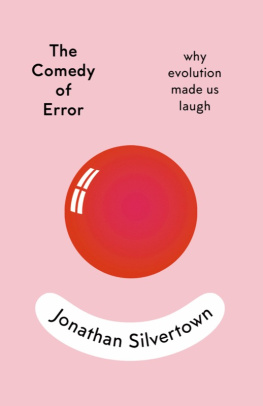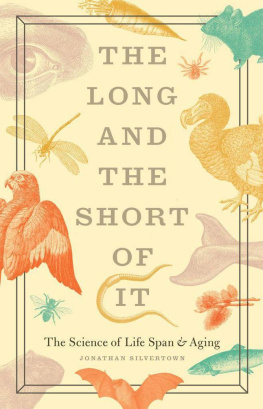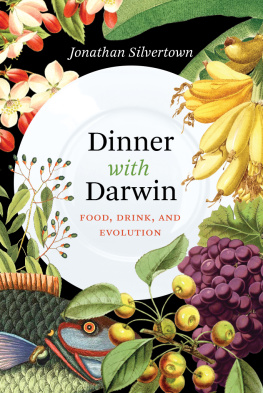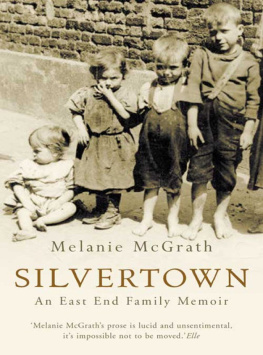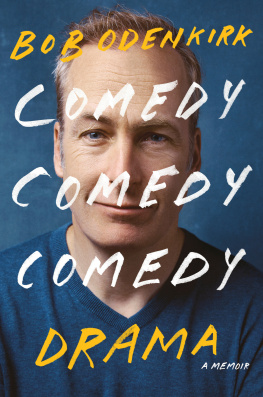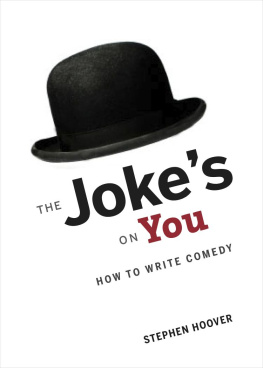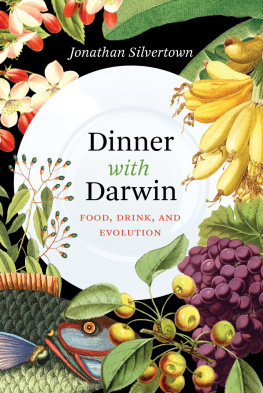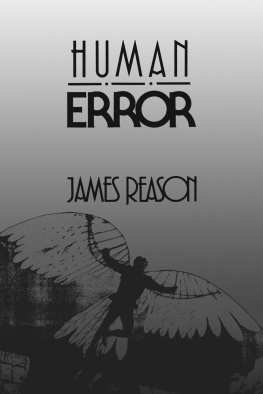Jonathan Silvertown - The Comedy of Error
Here you can read online Jonathan Silvertown - The Comedy of Error full text of the book (entire story) in english for free. Download pdf and epub, get meaning, cover and reviews about this ebook. year: 2020, publisher: Scribe Publications Pty Ltd, genre: Art. Description of the work, (preface) as well as reviews are available. Best literature library LitArk.com created for fans of good reading and offers a wide selection of genres:
Romance novel
Science fiction
Adventure
Detective
Science
History
Home and family
Prose
Art
Politics
Computer
Non-fiction
Religion
Business
Children
Humor
Choose a favorite category and find really read worthwhile books. Enjoy immersion in the world of imagination, feel the emotions of the characters or learn something new for yourself, make an fascinating discovery.
- Book:The Comedy of Error
- Author:
- Publisher:Scribe Publications Pty Ltd
- Genre:
- Year:2020
- Rating:5 / 5
- Favourites:Add to favourites
- Your mark:
- 100
- 1
- 2
- 3
- 4
- 5
The Comedy of Error: summary, description and annotation
We offer to read an annotation, description, summary or preface (depends on what the author of the book "The Comedy of Error" wrote himself). If you haven't found the necessary information about the book — write in the comments, we will try to find it.
The Comedy of Error — read online for free the complete book (whole text) full work
Below is the text of the book, divided by pages. System saving the place of the last page read, allows you to conveniently read the book "The Comedy of Error" online for free, without having to search again every time where you left off. Put a bookmark, and you can go to the page where you finished reading at any time.
Font size:
Interval:
Bookmark:

The Comedy of Error
Jonathan Silvertown is Professor of Evolutionary Ecology in the Institute of Evolutionary Biology at the University of Edinburgh. He is the author of seven previous books.
Scribe Publications
2 John St, Clerkenwell, London, WC1N 2ES, United Kingdom
1820 Edward St, Brunswick, Victoria 3056, Australia
First published by Scribe 2020
Copyright Jonathan Silvertown 2020
All rights reserved. Without limiting the rights under copyright reserved above, no part of this publication may be reproduced, stored in or introduced into a retrieval system, or transmitted, in any form or by any means (electronic, mechanical, photocopying, recording or otherwise) without the prior written permission of the publishers of this book.
The moral right of the author has been asserted.
Every effort has been made to acknowledge and contact the copyright holders for permission to reproduce material contained in this book. Any copyright holders who have been inadvertently omitted from the acknowledgements and credits should contact the publisher so that omissions may be rectified in subsequent editions.
9781913348182 (UK edition)
9781922310095 (Australian edition)
9781925938456 (ebook)
Catalogue records for this book are available from the National Library of Australia and the British Library.
scribepublications.co.uk
scribepublications.com.au
For Rob, a most dedicated friend
Contents
Chapter One
Chapter Two
Chapter Three
Chapter Four
Chapter Five
Chapter Six
Chapter Seven
Chapter One
Comedy and Error
Its a delightful thing to think of perfection, but its vastly more amusing to talk of errors and absurdities.
Fanny Burney (17521840)
There is comedy in errors. Shakespeare showed us so, although the connection between error and humour had been recognised for millennia. The Bard took the plot for his Comedy of Errors from the Roman playwright Plautus, amplifying the farcical effect of the original by adding a second helping of mistaken identity between his characters. But 21st-century science has discovered something genuinely new about the comedy of errors that neither Plautus nor Shakespeare could ever have conceived.
It turns out that errors are much more than just a plot device for humorous tales they are the very essence of what we find funny. There is an area in the human brain that is specifically dedicated to detecting errors. These errors are processed, compared with expectation, and those judged humorous ricochet around the brain, producing laughter. Suddenly, with this discovery, the two cultures of science and art have collided and, like strangers meeting in a pub, we find them bonding over jokes. This book is witness to that unexpected and fruitful encounter. Well probe the questions it throws up, catch the jokes that fly out, and find deeper meaning in frivolity.
Why are some errors funny and others not? Why is laughter involuntary and infectious? Laughter is found in all cultures and when heard it is recognisable across boundaries of language. Babies laugh and neither eyesight nor hearing is required to acquire the behaviour. All these characteristics strongly suggest that laughter is hard-wired into the human psyche, and to an evolutionary biologist like me that immediately provokes my favourite question: what good is it? Answering that question is the ultimate purpose of this book. Why did evolution make us laugh?
Though an evolutionary biologist, I tiptoed into this territory as an interloper, more used to interrogating the whys and wherefores of plants than of minds. What I discovered was that from Aristotle (384322 BCE ) onwards, (almost) anybody who wants to be taken seriously has written about laughter: Henri Bergson, Charles Darwin, Ren Descartes, Sigmund Freud, Thomas Hobbes, Immanuel Kant, Artur Schopenhauer, to name only the most hilarious. There are few things less entertaining than academics pontificating about laughter, as one more recent writer said, before proceeding to prove her point by doing just that. Pontificating can pay though:
How does the Pope pay his bills?
PayPal.
What have the professors of fun been up to? Do they wear clown shoes and baggy pants? And if they do, how can you tell them from ordinary professors? But I digress. In the Primer of Humor Research , the editor and godfather of humour scholarship calls trespassers like me first-timer pests, and abhors our weakness for jokes. Its a strange world in which the scholars are afraid that you will laugh, while the performers are scared that you wont. In the academic reference Handbook of Humor Research , the editors lament that: For reasons that remain unclear, many investigators published only one or two humor studies before abandoning the area in favour of some other research domain. Perhaps they were scared off by the godfathers scathing pen? Ive noticed the same lack of fortitude among scientists who study slugs. Laughter and molluscs seem equally fatal to an academic career. Some subjects, it seems, are better not taken too seriously.
A man walks into a cinema, sits down, and notices that there is a large slug sitting in the seat next to him.
What are you doing here? asks the man in surprise.
Well, I loved the book, replies the slug.
Which goes to prove that neither slugs nor jokes about them get us anywhere. An awful lot of blind alleys have been explored on the long road to understanding humour.
Back in the lab, a paper on how to get robots to be funny begins, First, laughter has a strong connection with humour. No shit, Sherlock!, you might say, but there is a serious distinction to be made. We should distinguish between humour the stimulus, and laughter the response. These are separate things and either may occur without the other, as any stand-up comedian knows only too well. Sir Ken Dodd (1927 2018) defined the craft of comedy, of which he was a consummate master, as the performance of humour to obtain laughter. There will be jokes, perhaps about slugs, that you recognise as humorous, but that dont make you laugh out loud. Conversely, a tickle can elicit laughter without the stimulus of humour. What tickles your fancy can be quite revealing.
Whats the difference between erotic and kinky?
Erotic is using a feather. Kinky is using the whole chicken.
We all instinctively know two things about laughter: one, it is a social phenomenon and two, it is not just about humour, but happens when humans are having fun. Psychologist Robert Provine listened in on peoples conversations and discovered that most laughter occurs in ordinary discourse and not, as one might have imagined, just when someone says something funny. You can test this out for yourself in any bar or social situation that lends itself to unobtrusive ear-wigging. Ive found it to be true. Charles Darwin knew it. Writing in 1872, he commented that when young people past childhood are in high spirits, there is always much meaningless laughter.
Can we work out how humour works and why we laugh at it? Should we even try, or is analysing a joke like using a pin to explain how a balloon works? Why does explanation deflate rather than enhance a joke? There is a scientific explanation that we shall explore later. However, there is also a romantic notion that the moment we try to analyse a thing of beauty or joy, we destroy it, much like a vivisectionist investigating a throbbing heart with a scalpel. I write in the conviction that the very opposite is true understanding increases rather than diminishes pleasure. This book is a test of that proposition.
Although most laughter happens spontaneously and not in response to humour, jokes are my scalpels in this book. They are selected to make you first laugh and then think. There is actually a prize, called the Ig Nobel, for scientific research that does the same thing. In 2018, the Ig Nobel Prize was won by a team of surgeons in Portland, Oregon for using postage stamps to test whether the male sexual organ is functioning properly. It makes you wonder what these guys think the proper function of the male sexual organ is. Actually, they used stamps to devise an inexpensive method for diagnosing erectile dysfunction during sleep. Well, only inexpensive if you use second class stamps, of course. You create a collar of stamps that fits snugly around said organ before you go to bed. If you wake up in the morning with the collar torn along the perforations, you can turn over and wake your partner with the good news. Who said philately will get you nowhere?
Next pageFont size:
Interval:
Bookmark:
Similar books «The Comedy of Error»
Look at similar books to The Comedy of Error. We have selected literature similar in name and meaning in the hope of providing readers with more options to find new, interesting, not yet read works.
Discussion, reviews of the book The Comedy of Error and just readers' own opinions. Leave your comments, write what you think about the work, its meaning or the main characters. Specify what exactly you liked and what you didn't like, and why you think so.

